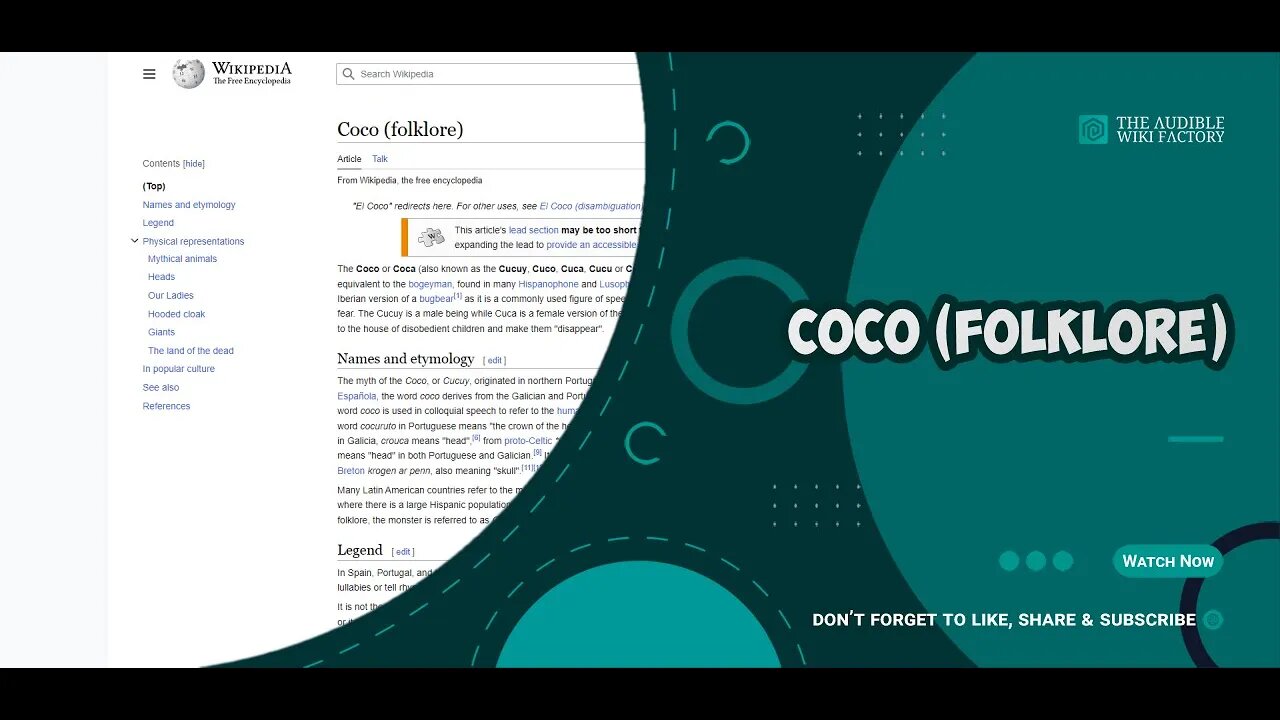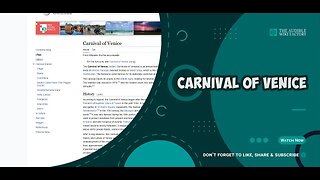Premium Only Content

The Coco or Coca is a mythical ghost-like monster, equivalent to the bogeyman, found in many
The Coco or Coca (also known as the Cucuy, Cuco, Cuca, Cucu or Cucuí) is a mythical ghost-like monster, equivalent to the bogeyman, found in many Hispanophone and Lusophone countries. It can also be considered an Iberian version of a bugbear as it is a commonly used figure of speech representing an irrational or exaggerated fear. The Cucuy is a male being while Cuca is a female version of the mythical monster. The "monster" will come to the house of disobedient children and make them "disappear".
NAMES AND ETYMOLOGY
The myth of the Coco, or Cucuy, originated in northern Portugal and Galicia. According to the Real Academia Española, the word coco derives from the Galician and Portuguese côco, which means "coconut". The word coco is used in colloquial speech to refer to the human head in Spanish. Coco also means "skull". The word cocuruto in Portuguese means "the crown of the head" or "the highest place" and with the same etymology in Galicia, crouca means "head", from proto-Celtic *krowkā-, with variant cróca; and either coco or cuca means "head" in both Portuguese and Galician. It is cognate with Cornish crogen, meaning "skull", and Breton krogen ar penn, also meaning "skull". In Irish, clocan means "skull".
Many Latin American countries refer to the monster as el Cuco. In northern New Mexico and southern Colorado, where there is a large Hispanic population, it is referred to by its anglicized name, "the Coco Man". In Brazilian folklore, the monster is referred to as Cuca and pictured as a female humanoid alligator, derived from the Portuguese coca, a dragon.
LEGEND
In Spain, Portugal, and Latin America, parents sometimes invoke the Coco or Cuca as a way of discouraging their children from misbehaving; they sing lullabies or tell rhymes warning their children that if they don't obey their parents, el Coco will come and get them and then eat them.
It is not the way the Coco looks but what it does that scares most. It is a child eater and a kidnapper; it may immediately devour the child, leaving no trace, or it may spirit the child away to a place of no return, but it only does this to disobedient children. It is on the lookout for children's misbehavior from the rooftops; it takes the shape of any dark shadow and stays watching. It represents the opposite of the guardian angel and is frequently compared to the devil. Others see the Coco as a representation of the deceased of the local community.
The oldest known rhyme about the Coco, which originated in the 17th century, is in the Auto de los desposorios de la Virgen by Juan Caxés.
The rhyme has evolved over the years, but still retains its original meaning:
Sleep child, sleep or else...
Coco will come and eat you.
The Portuguese lullaby recorded by José Leite de Vasconcelos tells Coca to go to the top of the roof. In other versions of the same lullaby, the name of Coca is changed to that of "papão negro" (black eater), the name of another bogeyman.
Leave Coca. Leave Coca
Go to the top of the roof
Let the child have
A quiet sleep.
The traditional Brazilian lullaby is as follows, with the Cuca as a female humanoid alligator:
Sleep little baby
That Cuca comes to get you
Daddy went to the farm
Mommy went to work.
Both Brazilians and Portuguese also have a bogeyman version, which sometimes acquires regional colors where the bogeyman (the shape-shifting Bicho Papão is a monster that is shaped by what the child fears most) is a small owl, murucututu, or other birds of prey that could be on the roof of homes at night (in Brazil) or a mysterious old man with a bag who is also waiting on the roof of the house (in Portugal).
Bogeyman
Atop the roof
Let my child have
A quiet sleep.
Verses and songs were used in pre-Roman Iberia to transmit history to the younger generations, as...
LINK TO ARTICLE: http://en.wikipedia.org/wiki/Coco_(folklore)
TAGS: Coco (folklore), Mythological monsters, Brazilian legendary creatures, Spanish-language South American legendary creatures, Myths and legends of Colombia, Colombian folklore, Supernatural legends, Mexican folklore, Spanish folklore, Portuguese folklore, Spanish legendary creatures, Portuguese legendary creatures, South American mythology, Mythology of the Americas, Brazilian folklore, Brazilian mythology, Latin American folklore, Medieval European legendary creatures, Ghosts, Shapeshifting
#GeneralKnowledge #AudibleWikiFactory #Audible #Wikipedia #Coco(folklore)
-
 13:12
13:12
The Audible Wiki Factory
2 years agoThe Carnival of Venice is an annual festival held in Venice, Italy. The carnival ends on Shrove
563 -
 6:48:52
6:48:52
SpartakusLIVE
7 hours agoNEW Buyback Mode is the MOST FUN I've had on WZ in YEARS
28.3K -
 1:12:40
1:12:40
Adam Does Movies
6 hours ago $1.34 earnedThe Best & Most Overrated Christmas Movies - LIVE!
20.9K2 -
 9:09:04
9:09:04
BubbaSZN
9 hours ago🔴 LIVE - SLAYING ZOMBIES W/ CATDOG UNTIL MY BDAY AT 12AM!
24.4K5 -
 4:47:55
4:47:55
SlingerGames
5 hours agoRumble Spartans, ASSEMBLE! | Push for 400 Followers
16.6K2 -
 5:22:07
5:22:07
xXFadedAngelXx
9 hours agoSPARTAN NIGHT! Featuring the Communiy! Thanks @OhHiMark! & @Phyxicx! for the invite
28.3K1 -
 LIVE
LIVE
AdmiralSmoothrod
8 hours agohalo MCC - Multiplayer Rumble No. 21 - its gonna get sticky
78 watching -
 1:35:22
1:35:22
BlackDiamondGunsandGear
6 hours agoNEW Glock Gen6 / Still Hate them / After Hours Armory
11K2 -
 8:49
8:49
Hollywood Exposed
7 hours agoBill Maher Explodes After Killer Mike Refuses Any Accountability On Air
8.31K13 -
 1:35:22
1:35:22
DLDAfterDark
6 hours ago $0.95 earnedThe Average Gunfighter - Gen 6 Glocks - The After Hours Armory
6.49K